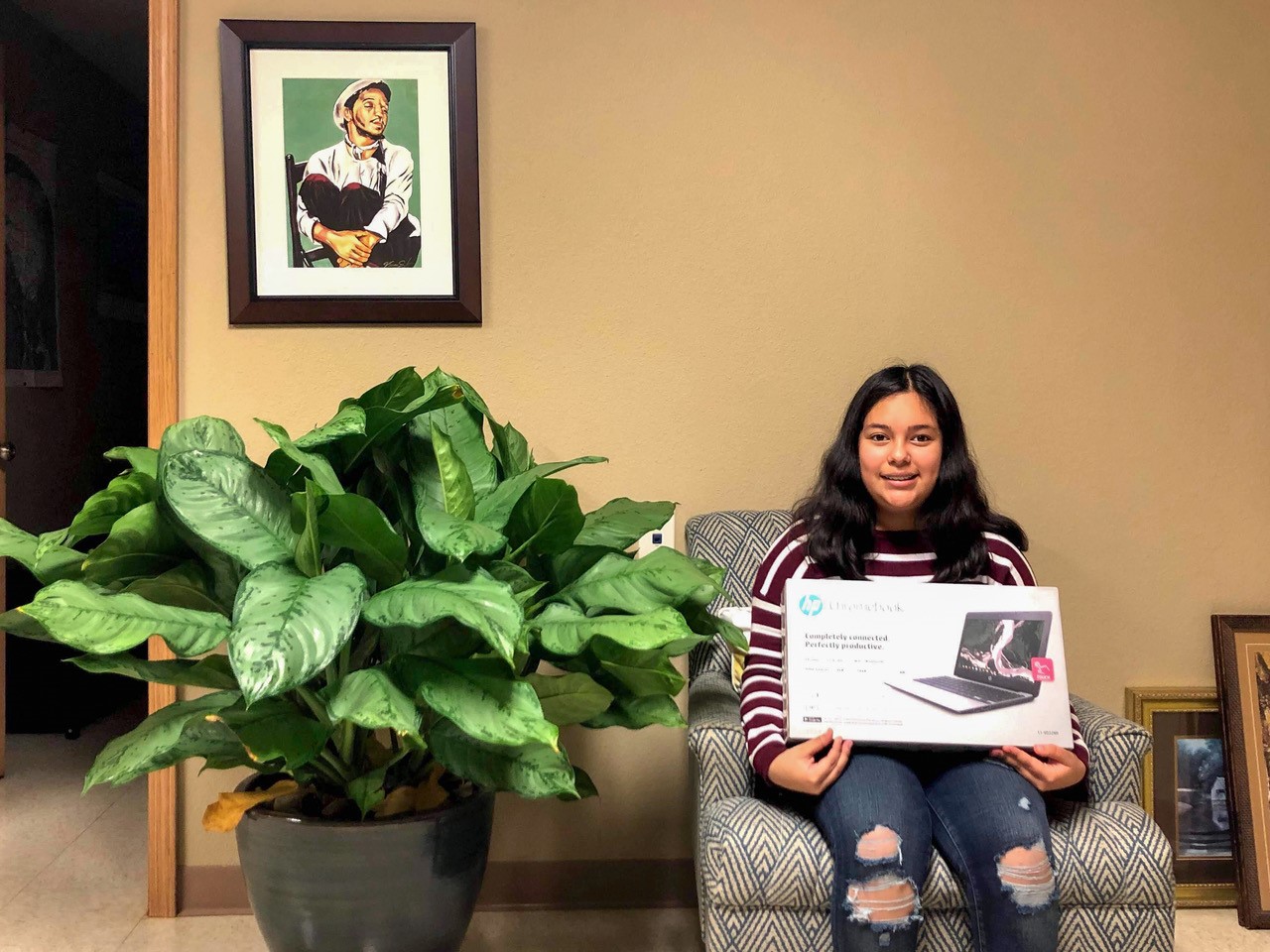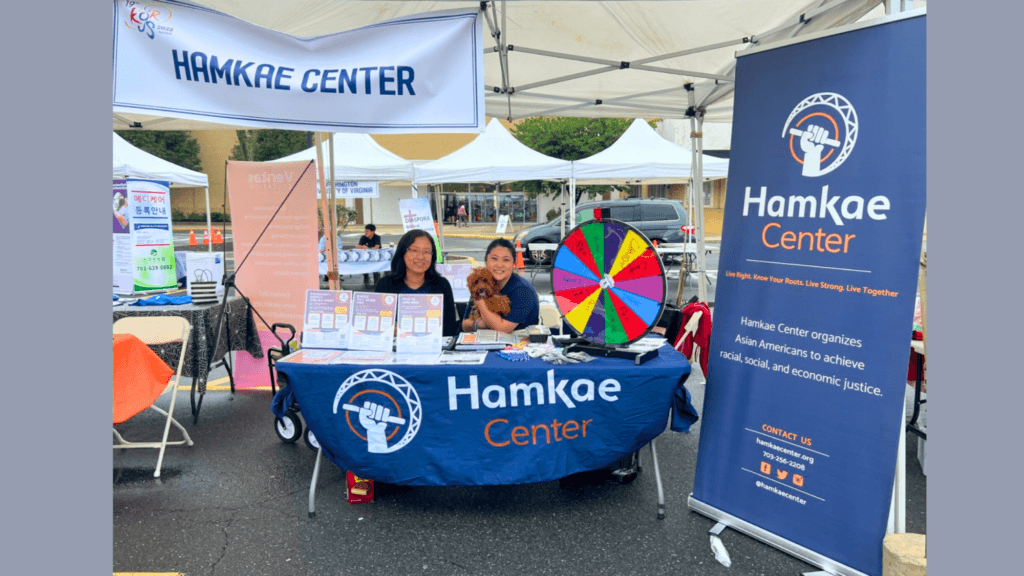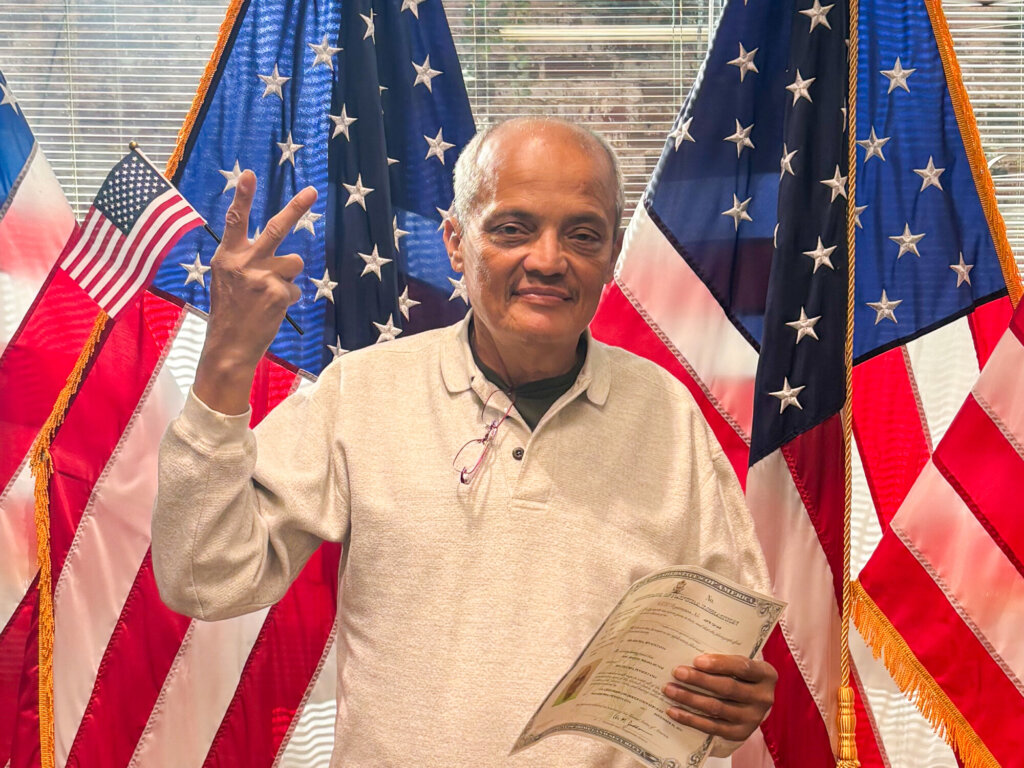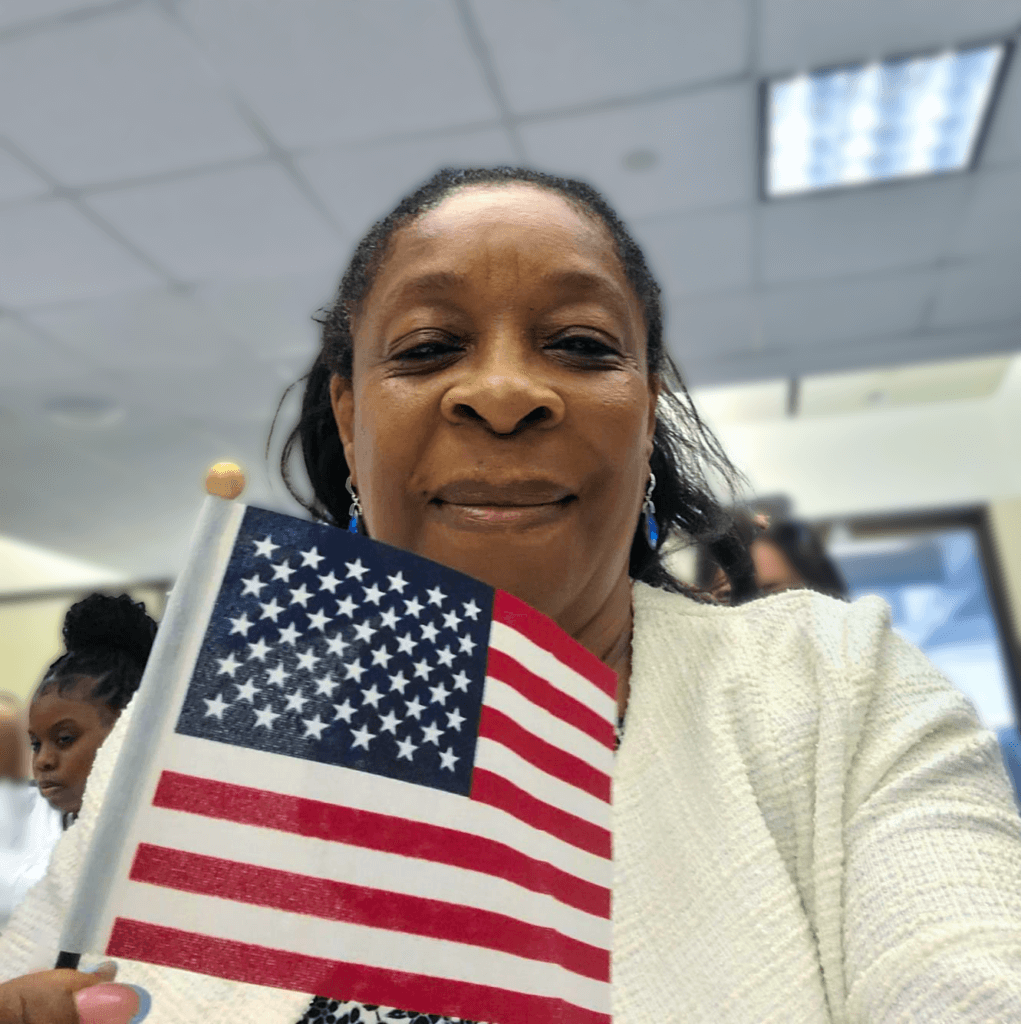Martha Olivas: “For so long I felt that this is my children’s country, my grandchildren’s country, and now I know it is my country too.”

Explore more
Martha Olivas, who became a citizen on February 28, 2020, told us her story with the help of Michel Rangel, an immigration program coordinator at Arkansas Immigrant Defense, a New Americans Campaign partner, who translated the discussion from Spanish.
(Photo courtesy of Arkansas Immigrant Defense)
Martha Olivas: I applied for citizenship because that
was my dream, I love this country. I’ve worked up to three jobs at the same
time. It’s been a very long road. Every time I heard the national anthem, I
would think of it as my children’s anthem, because they were born here.
Sometimes I would see those big American flags and I would think to myself,
that is my children’s flag and one day it’s going to be my flag as well.
When the five-year anniversary of my permanent residency was coming up, I think God sent me a sign. I got a Facebook advertisement for a citizenship workshop at Arkansas Immigrant Defense. I got the information and decided that I would be the first person that they were going to assist that day. My husband dropped me off with my younger daughter before he took my older daughter to the university. The workshop opened at 10:00 am; I got there 30 minutes before.
Michel Rangel: Martha wasn’t just the first on the line, she was our first citizenship workshop client ever. Arkansas Immigrant Defense is a very new organization, one of the only nonprofit law firms in Arkansas. We got a New Americans Campaign grant and at the NAC conference we were able to attend a citizenship workshop training in California last August. We gave ourselves until November of last year to fine tune how we wanted to conduct the workshop and to advertise. Around 30 people walked in for appointments that day. Because Martha was the first, she probably spent about three or four hours with us, helping us figure out what we had to tweak for future workshops. By the end, she was able to walk out the door with an N-400 document that she could submit.
(Photo courtesy of Michel Rangel)
We were super apologetic, we kept saying, “We’re sorry it’s
taking so long!” She was so gracious with us, so patient. She said, “It’s fine.
I get it. It’s paperwork, it’s fine.” It was really stressful to pull off that
first workshop and to have someone show you grace, in moments of chaos like
that—Martha was a huge inspiration for us to keep doing the workshops.
Afterward, we called all the people who attended to ask whether anyone was
interested in volunteering at our future workshops. Martha was our first call,
of course, and she said yes.
Martha: I understood that it was their first time.
The first time you do something there are going to be some hiccups. I could put
up with all that because I had a goal in mind. I also didn’t have money to pay
an attorney. It was really an opportunity that presented itself to me and I was
going to stick it out. My patience comes from God. They helped me at the
workshop on a Saturday and I mailed in my application that Monday.
I first came to the United States from Sinaloa, Mexico. I
was 22 years old and I stayed with my sister in California who was married and
had just had her first child. When I gave birth to my son in the United States
it motivated me to learn English. In the mornings I worked in a hospital
kitchen, helping the cook, and in the evenings, I went to English classes. When
my work at the hospital ended, I couldn’t find another job in California. But
another sister had moved to Rogers, Arkansas. She told me there were many more
opportunities there.
When I got to Arkansas, I did not appreciate it compared to
California, which is very beautiful. But there was a lot of work in Arkansas
and better pay. After I moved, I made almost three dollars an hour more. I
thought, “Wow, I like it here!” I thank God that I’ve been able to work all
this time. Eventually, I warmed up to Arkansas. I met my husband here. He is
from El Salvador. He works at a hospital where he cleans surgical rooms. We
married and had two daughters together. I’ve lived here 22 years now, and I
love this place.
Michel: I was born in Mexico too, in Guanajuato. I
came to Arkansas as a baby and grew up in Fort Smith. I was undocumented until
I was 19 years old. During my first semester at the University of Arkansas my
dad was working two jobs to pay for it. It was exhausting for him, and it was
exhausting for me to see. I felt so guilty. I saw that there was a forum at my
local church about the Dream Act. I applied for DACA and got my permit. But at
the same time, my dad was petitioning for me, and I received my permanent
residency in 2013, a month after I got DACA. It was crazy because I went from
having absolutely nothing, to having different, official cards, with my face on
them saying, “It’s cool, you can be here.” I became a citizen in December of
2018.
(Photo courtesy of Michel Rangel)
My personal experience sent me down this path—doing
advocacy, civic engagement, and helping eligible people to apply for
citizenship. I saw United States citizenship as being so valuable. You have an
ability to change policy by voting for candidates who can be the voices for
those who need it right now. I started officially with Arkansas Immigrant
Defense in 2019 and I’m now a partially accredited representative.
Martha: My younger daughter Anahi helped me study the
questions for the citizenship test. It was a collaborative effort. I got a
notebook and I wrote down the questions and answers several times. When I
entered the interview, I was feeling super confident, super sure of myself. I
answered all the questions about myself and my application without a problem.
But when I got to the first question for the actual civics test, I froze. I was
really nervous. I had the answer in my head, but I couldn’t quite say it, so I
missed that first question.
The immigration officer asked me six more questions and I
passed. During the English language portion, he asked me to read a sentence and
I read it perfectly. Then he asked me a question and I had to write the
response. I remember that the answer was 100 senators. To show off, I asked
him, “Do you want me to write the number 100, or would you like me to spell it
out?” He said, “However you like.” I told him, “I’m going to spell it out, so
that you can really see that I know how to write in English.”
After I took the test, I went outside and saw my two girls
waiting for me. I was crying and they asked, “What happened Mami? Did you
pass?” And I said, “I’m crying because I’m very happy. Yes, I passed!” And my
daughters were jumping and jumping. My kids and my husband were very happy.
Michel: After her interview, Martha called us and
left a voicemail. We all called her back, circled around the phone, waiting to
hear how it went. I remember Martha telling us that she was distracted during
the test, because the USCIS officer was cute. That’s Martha!
Martha: Let me
tell you a secret. This is my other family. I’m a volunteer for them and when
these people need help, I am ready. Everybody is very nice. I love all the
girls and the guys here.
Michel: She really does like us. She says because she
is older than most of us, she feels like she’s our mom, and she’s officially
adopted us. At our workshop in December, Martha came back to volunteer. We did
the second workshop by appointment and Martha and her daughter helped check
people in at the front desk. Martha actually cooked for everybody. That was
awesome. She cooked posole rojo and Salvadoran quesadillas. She’s a bright
light in our work and her food is delicious.
Martha: At the workshop I motivate everybody. I say, “don’t
worry, you study hard and you will pass the test. It’s very easy.” I also
motivate my friends, and the people at church, and everybody, saying “Go! Go
for citizenship!”
Michel: We received a New Americans Campaign
innovation grant that allowed us to be innovative with the way that we conduct
the workshops. One of the projects that I took on was a referral system, where
people earned raffle tickets based on their participation. If you completed the
N-400 at our workshop you got a ticket, if you volunteered at a workshop you
got another entry, for each person you referred you got a ticket, and so on. We
had different items that you could win, like a television, Apple AirPods Pro, a
Keurig, or a laptop. Martha had several tickets and her 12-year-old daughter
Anahi had one. Martha put hers in the television pool and Anahi put hers in for
the laptop, because she wanted it for middle school. Martha called me right
before we began the drawing and asked me to move her tickets to the laptop to
give Anahi a better chance. I moved them and we held the drawing and Anahi’s
ticket won the laptop!
Martha: My family came with me to my oath ceremony,
my husband, my kids, my grandkids, and my daughter-in-law. It took so many
years, it still feels like a dream that I actually became a U.S. citizen. The
immigration official said, “Welcome to the United States.” I felt that I’ve
been here for a long time already, but if he wants to welcome me again, that is
okay. For so long I felt that this is my children’s country, my grandchildren’s
country, and now I know it is my country too. I felt so happy singing the
national anthem. Citizenship is very important because of all the benefits that
come with being a citizen, but most importantly the stability and peace of mind
that it brings. I sleep a lot better now because I know that I am a citizen and
I can’t be separated from my children.
Michel: I know Martha said that becoming a citizen
was a dream, but I also feel that she’s been a dream come true for us as an
organization with a vision coming to reality. The relationship we have with her
and her family has gone beyond all our expectations for the workshops.
Martha: Now I have to register to vote, but I’m not
sure where to go.
Michel: Martha, come to us!



